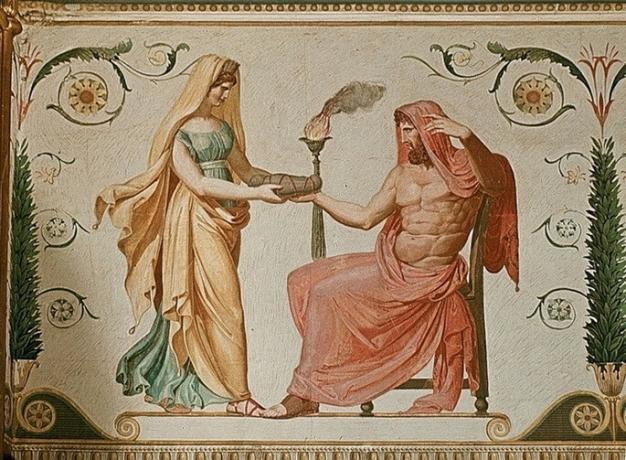Myth (from the Greek mythos) is a fantastic narrative that aims to explain the origin of everything that exists and is considered important for a particular people. The gathering of these narratives forms a set of explanations about the world called mythology.
Mythology as it is known today has its origins in ancient Greece. The polytheistic Greek culture (belief in many gods) made it possible to create a complex model of interpretations about the origin of the world and the relationship of human beings with nature and these gods.
The myths fulfill the role of teaching through stories full of symbolism, which relate supernatural elements to the lives of human beings, giving lessons on how to live.
the meaning of myth
Over time, myths took on other meanings and their use began to determine other meanings.
Initially, the myth refers directly to a fantastic narrative understood as true, which explains the origin of everything that is relevant to human life.
From the production of knowledge based on logic, the symbolisms of the myths were abandoned and their accounts began to be understood as fiction.
Nowadays, myth can be synonymous with falsehood or lie. The opposition between "truth or myth" has become very common and is due to the fantastic tradition of mythical stories and their lack of consistency with reality.
The meaning of myth also relates to some aspect that might seem superhuman or supernatural. A person can be called a myth when his actions seem to be beyond ordinary people, such as the Greek deities.
Thus, people who are very prominent in their fields (for example, in sports, in the arts, etc.) are often called myths.
Characteristics of myths
Traditionally, myths have some characteristics of their own and were responsible for reporting the origin of gods and things.
These are narratives that do not have a rigorous logic and use symbols that are easy to recognize and understand. In myths there is no definite boundary between what is natural and what is supernatural.

The emergence of the universe and the elements of nature are the main themes of the myths. So that everyone can easily understand, they use the idea of birth (gonos) of things. Birth is used as one of the main symbols present in myths because it is something very common in everyday life and simple to be understood.
Thus, reports about the origin of things are constantly associated with the idea of a birth or birth. Thus, myths are full of relationships between the gods who give birth to the universe and natural elements.
The Greek myths that related the origin of things can be divided into two categories:
- Theogony: narratives about the birth of the gods and its power.
- Cosmogony: narratives about the birth of the universe and the elements of nature.
Some examples of myths:
- Myth of Cronus - about the time and birth of the gods.
- Pandora's Myth - about the first woman, human curiosity and the emergence of problems in the world (similar to the biblical passage about Adam and Eve).
- Myth of Orpheus and Eurydice - about fate and death.
- Myth of Eros and Psyche - about love and its union with the soul.
- Narcissus Myth - About beauty and vanity.
What is mythology?
In ancient Greece, Greek mythology was a complex system of these narratives, which guided everyone's lives. The myths taught the moral principles, the virtues and guided the relationship with the gods and nature.
Mythology is a way of giving meaning to human existence, its various stories are able to satiate curiosity human knowledge about fundamental questions such as "where did we come from?", "where are we going?" or "because one day it rains and the next Sun?".
In a period before science, they explained in a simple way, appealing to images present in the collective imagination, everything that could be a source of questioning.
See too:What is mythology?
Myth and Philosophy
As time went by, the fantastic narratives of the myths lost strength, the Greeks needed better explanations.
Mythical thinking was gradually replaced by logical-philosophical thinking. The explanations given by mythology lacked a logical coherence, were based on belief and could not be questioned.
Philosophy emerges as a way to produce rational knowledge, which must be based on logic and constantly questioned in order to reach the truth.
Interested? See too:
- Myth and Philosophy
- The Origin of Philosophy
- Greek mythology
